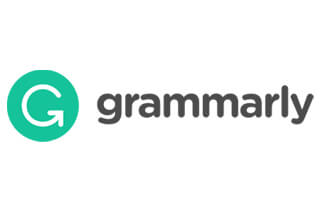What is Grammarly?
Grammarly is an online tool designed to empower users with perfect spelling and grammar, ensuring you make the most of every word. Furthermore, it guides you through various ways of refining your copy, suggesting alternatives for overused words and even exposing areas of plagiarism.
In short, it’s a powerful piece of kit that every content marketing agency should have in their arsenal, safeguarding against typos and highlighting waffling prose that fails to flow.
We use the premium version on a daily basis, but there’s also a free plugin available for web browsers. You may have seen their advert on TV, or perhaps as a YouTube trailer where it’s nearly clocked up over 800 million views:
So, let’s see what you can get without spending a penny…
How does the free Grammarly plugin work?
Downloading the extension is easy, with the message ‘Add to Chrome’ (or whatever browser you happen to be using) prominently displayed on the homepage.
After a quick click, you’re ready to go; Grammarly will follow you around the Internet like a nerdy friend, pointing out your mistakes but only because it has your best interests at heart. I mean, you wouldn’t want to undermine your whole business model by tweeting erroneous updates, especially when content writing is one of your core services.
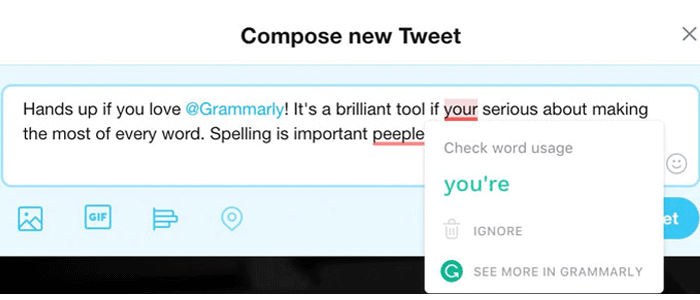
It works at the speed of light to flag up your flaws, highlighting words that are either misspelt or used out of context. If you’re put off the idea of downloading an extension for fear of it slowing down your browser, you needn’t worry; you really won’t notice it’s there until you make a mistake, and then you’ll be grateful for its pedantic persistence.
Clicking on the ‘See More In Grammarly’ button (bottom right) expands the experience, with the Grammarly editor overlaying your web page rather than opening up a new window.
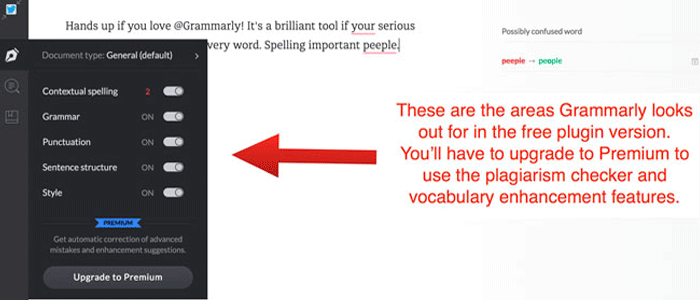
If you access your email account via your web browser, Grammarly will automatically be on hand to offer assistance as you compose your messages. However, if you use Outlook, you’ll have to download the free Microsoft Office add-in, which is also compatible with Word. However, this is currently only available to Windows PC users.
Of course, the Microsoft suite already has its own spell checker, which is pretty substantial, but Grammarly claims to pick up on things that Office overlooks. Indeed, there are a number of videos on YouTube which show documents that pass Word without a hitch, yet clicking on the Grammarly button flags up multiple mistakes unreported in Word.
The Bespoke Digital team prefers to use Google Docs when writing content, as the Cloud-based collaboration is much more efficient than saving multiple versions of documents, tracking changes and emailing them back and forth.
Google Drive has only recently supported Grammarly plugin, and it’s still in beta mode, so we often draft documents in Docs and then paste them into Grammarly’s web-based editing platform to run a final proof. This might sound like a faff, but the benefits far outweigh the con of spending five seconds to copy and paste.
Without this process, we could have easily overlooked an error such as this, ironically misspelling the word ‘misspelt’, using the American version instead of British:

Pro tip: If you prefer British to American spellings, be sure to change your Grammarly settings accordingly, clicking Profile > American/British > British English.
Likewise, in Google Docs you should click File > Language > English (United Kingdom). This will prevent you from making such unpatriotic errors.
Having amended the misspelling, we thankfully no longer have any critical issues at this point in the article. However, my eye is drawn to the yellow warning sign at the bottom of the page:

So, what do you get for your money if you click on the upgrade button?
What are the benefits of Grammarly Premium?
The best value plan is currently priced at $139.95 (around £110), giving you an annual membership. If you’re a professional marketer and being word perfect is important to you, this is a bargain, especially if you’re tasked with editing other people’s work.
At times, you may think your grammar buddy is being a little over-zealous. Of the five advanced issues it’s so keen to point out, one of them was the ellipsis at the end of this sentence: “So, let’s see what you can get without spending a penny…”

Well, it’s not entirely necessary, but I like it as a bridge between the introduction and the following section. Thanks for the heads up, G, but I’m leaving it there.
The next gripe came here: “If you’re put off the idea of downloading an extension…”
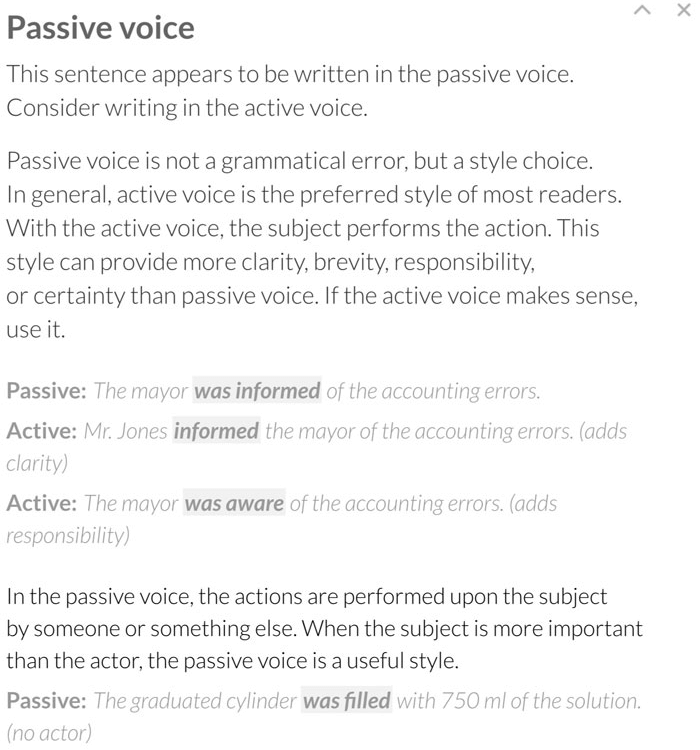
Sound advice, but the key thing to remember is, as noted in the explanation, this isn’t a grammatical error, just a style choice. Reworking your words from passive to active can be challenging, but if you’re up for the challenge there’s more advice on getting it right here.
Editing the sentence to “If you don’t like the idea…” would have satisfied the Grammarly gods as it’s stronger than “If you’re put off by the idea…” but I’ve kept in this article to illustrate the point. Plus, it doesn’t read badly so it’s not a major issue.
Don’t worry too much about the odd stumble into passive voice, but if it’s an ongoing issue you should definitely brush up on your way with words.
Grammarly also took umbrage with this: “Of course, the Microsoft suite already has its own spell checker…”

Tautological phrases such as ‘old in age’, ‘early in time’ and ‘blue in colour’ unnecessarily repeat information, and it’s considered good practice to be economical with language.
Perhaps linguistic purists would side with Grammarly on this one, but using “its own” doesn’t feel out of place and certainly isn’t as bad as the examples noted above, so I’m keeping it in.
The next red flag cropped up here: “This might sound like a faff, but…”
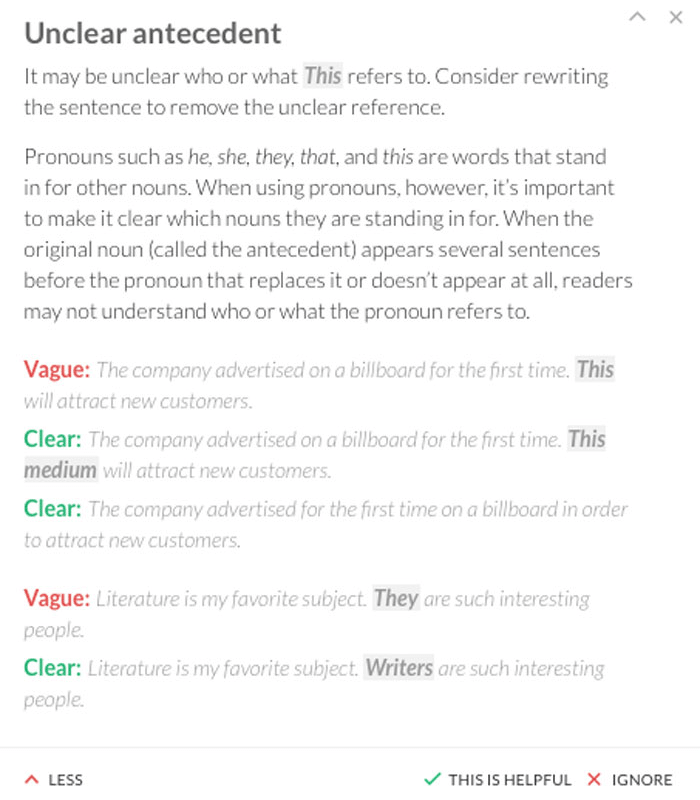
Changing to “This process…” would have made it clear what “This” referred to, and I endeavour to bear this in mind in the future.
The final debatable misdeed occurred when slipping into slang:

It’s great to have this highlighted and has made me think twice, but hopefully, you won’t have disapproved of my use of the word faff. Again, it doesn’t feel out of place, so it remains.
Ultimately, you can take or leave these advanced issues – they’re largely a matter of personal choice – but let’s see where Grammarly Premium really earns its money…
Plagiarism checker
This is invaluable when editing the work of others because Google frowns upon duplicate content and your webpages are likely to be filtered out of search results if the ratio of unique to duplicate content is low.
Plus, it’s extremely bad form to copy someone without making it clear that you’re quoting them, an issue which could see you end up in court and issued a substantial fine on the grounds of copyright infringement.
This is what happens when copying a paragraph from our guide to writing case studies:
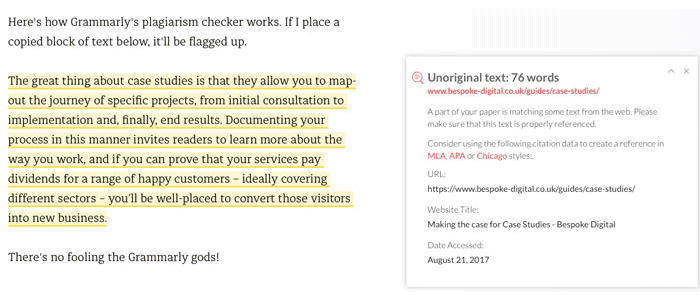
It immediately flags up the original source, detailing the webpage where the content was first published. If you use freelance writers, or if you’re reviewing and fine-tuning the words currently used on a client’s site, having this insight is a godsend.
I’d pay the annual subscription for this feature alone; it gives you tremendous peace of mind and can prevent you from unknowingly making the costly error of publishing other people’s work under your own banner.
Vocabulary enhancement
We’ve always got Thesaurus.com open when writing, helping to ensure our work flows with natural variations of words and phrases, but Grammarly is great at highlighting specific words that are often overused and suggesting alternatives:

These suggestions are unlikely to pop-up very often, but they’re great for refining your work even further and can certainly help you avoid repetition.
Document type
To be frank, we’d never used this feature before sitting down to write this article. We generally use the default option, but you have the flexibility to select various document types within Grammarly.
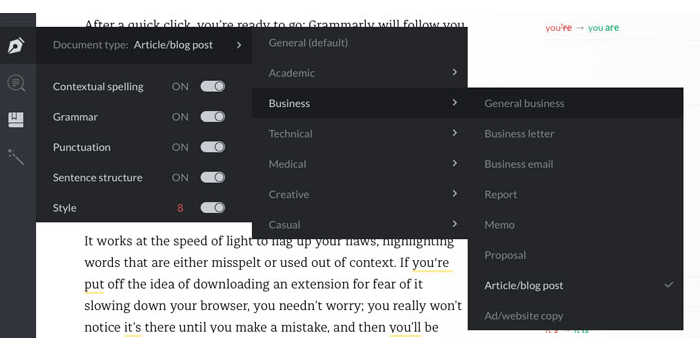
However, as you can see above, when using the business option it tries to steer you into very formal language, i.e. using you are instead of you’re.
You may find this useful in some circumstances, but we don’t think there’s anything wrong with taking a conversational approach to blog posts.
Final thoughts
Google is on an eternal quest to deliver the very best user experience, meaning the highest quality content will outrank competitors in the SERPs. Thus, if you’re output is littered with spelling and grammatical mistakes, you’ll be limiting your chances of performing well in organic search. In fact, you’ll also be restricting your success rate in pay-per-click, as your AdWords ‘quality score’ is largely based on the proper use of language.
What’s more, if your copy fails to stand up to scrutiny, you could be undermining your whole operation, potential customers deterred by the fact that you couldn’t be bothered to proofread, so why should they trust you to deliver a quality service for them?
Grammarly is an incredible tool for overcoming such problems, helping you produce content that paints you in the most favourable light. It’s a trusty sidekick, always on hand to give you a nudge in the right direction, and in our opinion, it’s well worth the subscription fee.
We’re always looking for ways to improve content production, and couldn’t deliver our high-quality service without deferring to Grammarly’s expertise. If you’d like to hear more about how our integrated approach to SEO and content marketing can help you, please drop us a line at enquiries@bespoke-digital.co.uk and to book a Free Digital Health Check.

